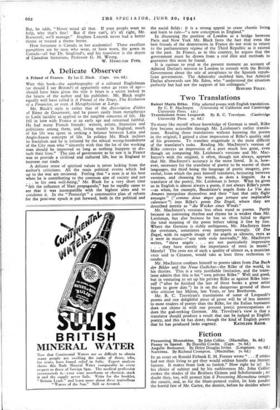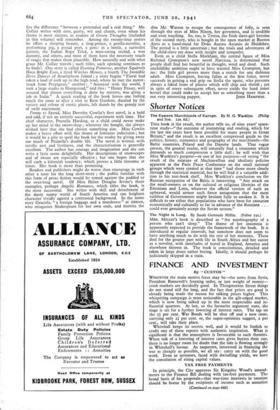Fiction
IN an essay on Ronald Firbank E. M. Forster wrote " . II critics had not their living to get they would seldom handle any literary fantasy. It makes them look so foolish." How right he is! In his choice of subject and by his ruthlessness Mr. John Collier evokes the shades of the Brothers Grimm and Scheherazade ; no doubt they, too, will protect him if Presenting Moonshine tempts the casuist, and, as for the blunt-penned realist, let him ponder the horrid fate of Mr. Carter, the dentist, before he decides where
lies the difference " between a pretended and a real thing." Mr. Collier writes with ease, gaiety, wit and charm, even when his theme is most sinister, as readers of Green Thoughts (included in this volume) will remember. Among the twenty-four stories he offers a sleeping beauty, a frog-prince, a gorilla-novelist, a performing pig, a proud poet, a genie. in a bottle, a surrealist painter, the Indian Rope Trick, a man-eating orchid, a wax dummy, and others, and most of them have the necessary touch of magic that makes them plausible. How naturally and with what grace Mr. Collier travels ; such titles, such opening sentences as he finds! One story is called Evening Primrose, another Squirrels Have Bright Eyes, a third Witches Money, a fourth The Invisible Dove Dancer of Strathpheen Island ; a story begins " Fioral had taken a load of cork up to the high road, where he met the motor- truck from Perpignan," another: " Annoyed with the world, I took a large studio in Hampstead," and this: " Henry Fraser, well assured that almost everything is done by mirrors, was given a job in India." A quick reading of the book leaves one feeling much the same as after a visit to Kew Gardens, dazzled by the variety and colour of exotic plants, left dumb by the greedy zest of swift enjoyment.
Penny to Spend, Miss Dorothy Cowlin's first novel, is a bold and odd, if not an entirely successful, experiment with time. Her chief character, Prunella Harding, as a child could never make up her mind in the sweet-shop ; whatever she bought, she always wished later that she had chosen something else. Miss Cowlin makes a brave effort with this theme of feminine indecision ; but it would be a pity to spoil the book for the reader by giving away too much of Prunella's double life. The novel is written with terrific zest and liveliness, and the characterisation is generally excellent. The author has courage and imagination and she can write a lyric scene delightfully. Her descriptions of snowscapes and of swans are especially effective ; but one hopes that she will curb a kittenish tendency, which proves a little tiresome at times. Her book is more than promising.
Readers and publishers might do worse than encourage in each other a taste for the long short-story ; the public familiar with this form of prose fiction would be armed against the padded or the over-long novel. Of Miss Helen Douglas Irvine's three examples, perhaps Angelic Romance, which titles the book, is the most successful. She writes with skill and detachment of the dusty sunny world of South America and can heighten character vividly against a contrasted background. In the name story Graciela, " a foreign baggage and a murderess " at sixteen, who misquotes Shakespeare for her own ends, and marries the
dim Mr. Watson to escape the consequence of folly, is seen through the eyes of Miss Nixon, her governess, and is credible and even touching. So, too, is Teresa, the Irish slave-girl heroine of the second story, who is bought in the open market at Buenos Aires as a hand-maid for Dona Aurora Ascanio de Huidobro. The period is a little uncertain ; but the trials and adventures of the child-slave are done with insight and sympathy.
Even as a child Stella Markham, the central figure of Miss Richmal Crompton's new novel Narcissa, is determined that people shall find her beautiful in thought, word and deed. Such unchildlike ambition ought to have warned Miss Crompton, but no: the little girl proves more than a match for any dubious adult. Miss Crompton, having fallen at the first fence, never succeeds in getting a real grip on Stella the egoist, who presents always a faked front of plaster which will chip and shrink ; yet in spite of every subsequent effort, never yields the hard inner kernel that could make us accept her as something more than a



























 Previous page
Previous page